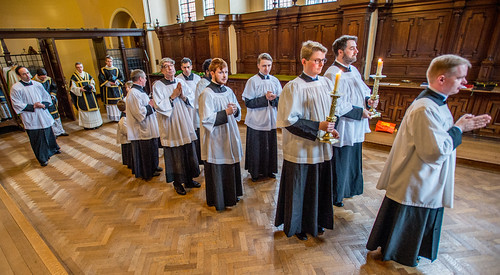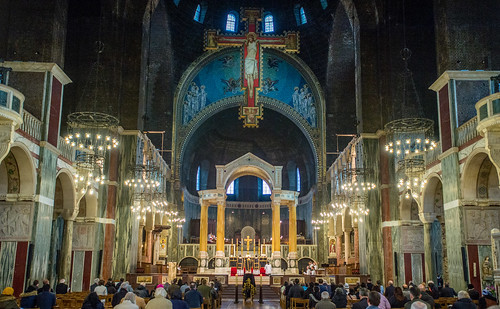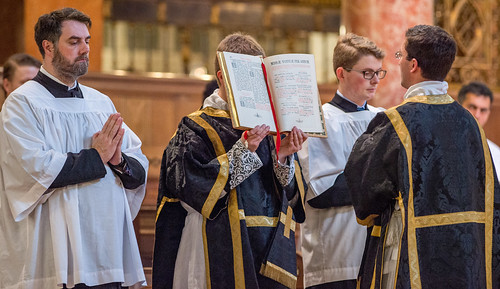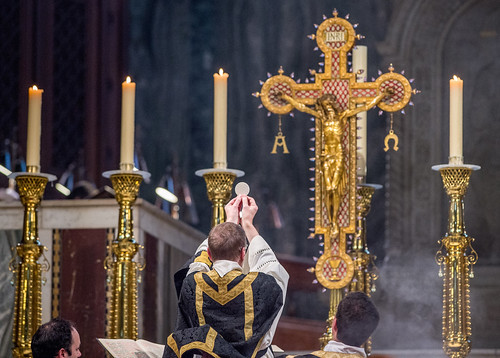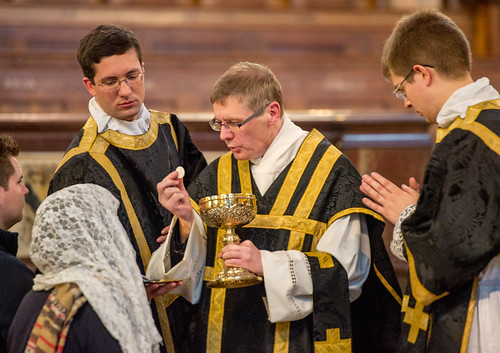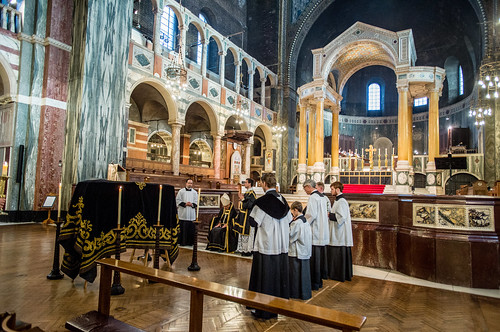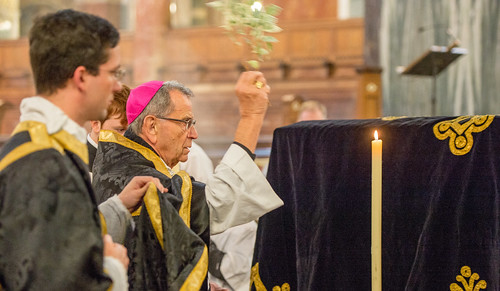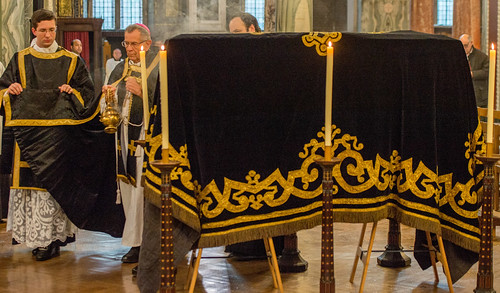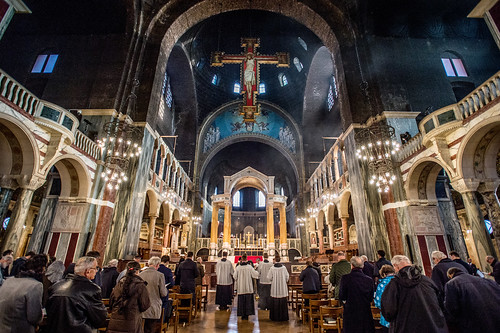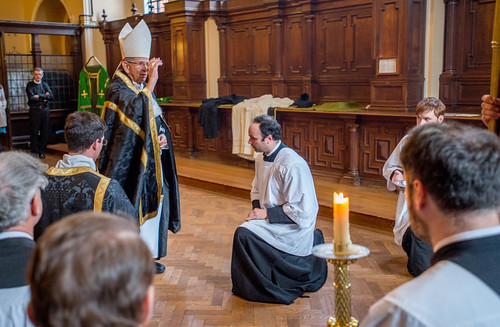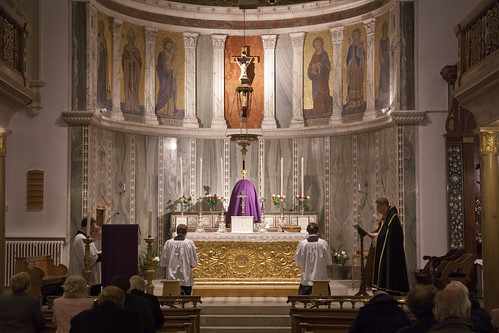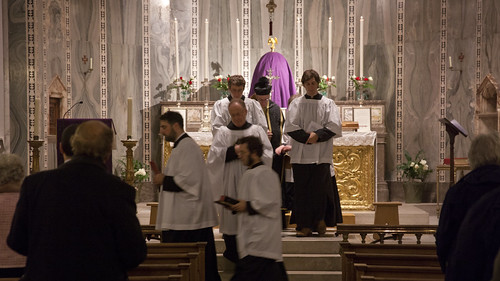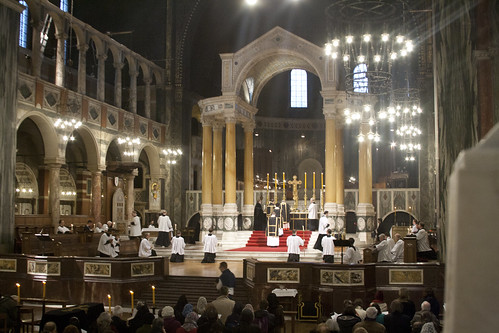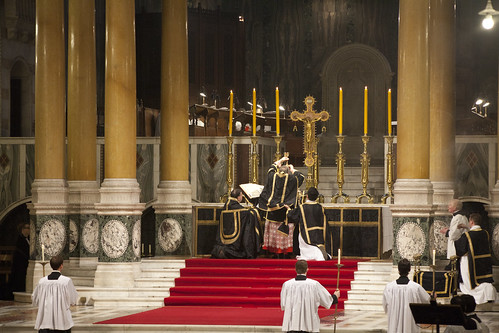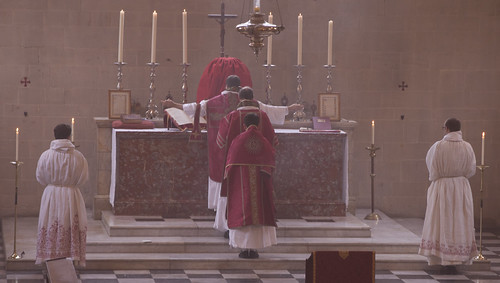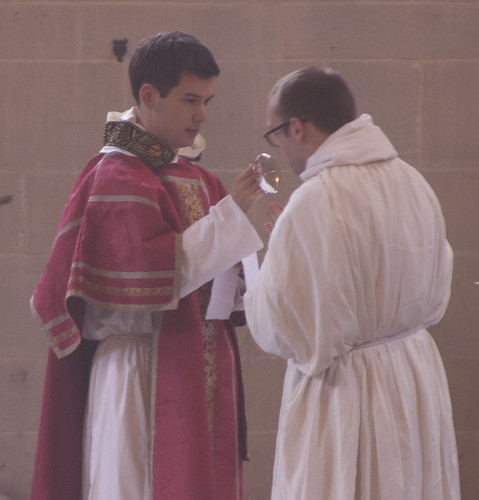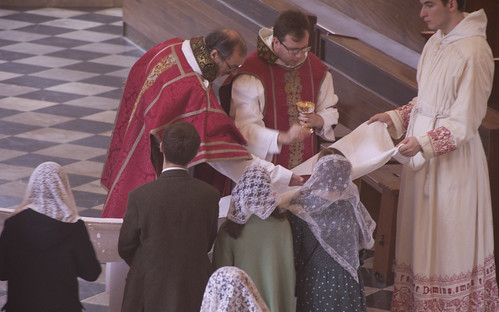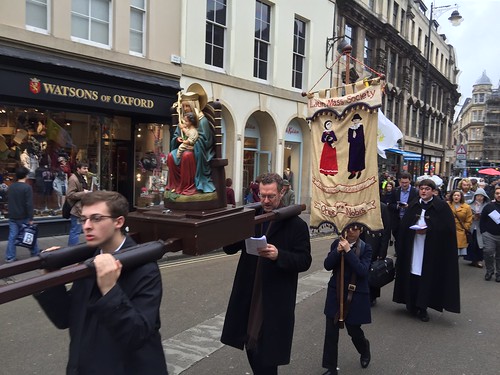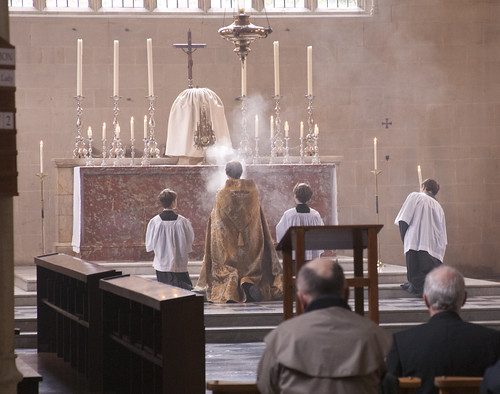Chairman's Blog
"a formal act of correction of a serious error"
Cardinal Burke speaks to Edward Pentin: see the NCR here. But I'm pasting in the whole interview - it is quite short. It answers some of the questions people have been asking, on this blog as elsewhere.
The step of making a 'formal act of correction' would be the preliminary, according to classical theology and Church discipline, of declaring someone - anyone - a formal heretic. Being a material heretic - having the wrong ideas and not realising it - could happen to anyone and doesn't have any implications for being in communion with the Church, holding offices and so on. (This is something sede vacantists don't always understand.)
The only people who could possibly give such a warning to a Pope would be, as Burke suggests, Cardinals and Bishops. What exactly would happen if the Pope received such a warning and ignored it (maybe twice or three times), is a matter of theological dispute. These are uncharted waters, and I still don't think it very likely we'll get to that point. The process itself is important, however, because as well as the Holy Father having the right that people speak to him honestly about their concerns, the Faithful have the right to guidance, from those in the Church with the competence to give it. That is why it is necessary that, at the appropriate time, this document has been made public.
It is possible (epistemically possible: 'for all I know') that there is a way to read all the documents in such a way that they cohere and the difficulties all go away. Such an interpretation cannot just be hinted at or adumbrated by private scholars: given the gravity of the situation, it must be done both clearly and authoritatively. That is what hasn't happened, and this initiative of Cardinal Burke has been to ask, politely but insistently, that if there is such an interpretation out there, Pope Francis should not be keeping it to himself.
---------------------
Support the work of the LMS by becoming an 'Anniversary Supporter'.
Letter of four Cardinals to Pope Francis for clarification of AL: unanswered
-------------------------
The letter containing 5 clarification questions ("dubia") was signed by four Cardinals on September 18 -- Italian Carlo Caffarra, emeritus of Bologna, American Raymond Burke, emeritus of St Louis and former president of the tribunal of the Apostolic Signatura, and Germans Walter Brandmüller, eminent historian and emeritus of the Pontifical Committee for Historical Sciences, and Joachim Meisner, emeritus of Cologne. They were sent with an accompanying letter.
The full text is provided below (several sources, including Edward Pentin and Sandro Magister).
1. A Necessary ForewordThe sending of the letter to His Holiness Pope Francis by four cardinals derives from a deep pastoral concern.We have noted a grave disorientation and great confusion of many faithful regarding extremely important matters for the life of the Church. We have noted that even within the episcopal college there are contrasting interpretations of Chapter 8 of Amoris Laetitia.The great Tradition of the Church teaches us that the way out of situations like this is recourse to the Holy Father, asking the Apostolic See to resolve those doubts which are the cause of disorientation and confusion.Ours is therefore an act of justice and charity.Of justice: with our initiative we profess that the Petrine ministry is the ministry of unity, and that to Peter, to the Pope, belongs the service of confirming in the faith.Of charity: we want to help the Pope to prevent divisions and conflicts in the Church, asking him to dispel all ambiguity.We have also carried out a specific duty. According to the Code of Canon Law (cc. 349) the cardinals, even taken individually, are entrusted with the task of helping the Pope to care for the universal Church.The Holy Father has decided not to respond. We have interpreted his sovereign decision as an invitation to continue the reflection, and the discussion, calmly and with respect.And so we are informing the entire people of God about our initiative, offering all of the documentation.We hope that no one will choose to interpret the matter according to a “progressive/conservative" paradigm. That would be completely off the mark. We are deeply concerned about the true good of souls, the supreme law of the Church, and not about promoting any form of politics in the Church.We hope that no one will judge us, unjustly, as adversaries of the Holy Father and people devoid of mercy. What we have done and are doing derives from the deep collegial affection that unites us to the Pope, and from an impassioned concern for the good of the faithful.Card. Walter BrandmüllerCard. Raymond L. BurkeCard. Carlo CaffarraCard. Joachim Meisner
2. The Letter of the Four Cardinals to the PopeTo His Holiness Pope Francisand for the attention of His Eminence Cardinal Gerhard L. MüllerMost Holy Father,Following the publication of your Apostolic Exhortation Amoris Laetitia, theologians and scholars have proposed interpretations that are not only divergent, but also conflicting, above all in regard to Chapter VIII. Moreover, the media have emphasized this dispute, thereby provoking uncertainty, confusion, and disorientation among many of the faithful.Because of this, we the undersigned, but also many Bishops and Priests, have received numerous requests from the faithful of various social strata on the correct interpretation to give to Chapter VIII of the Exhortation.Now, compelled in conscience by our pastoral responsibility and desiring to implement ever more that synodality to which Your Holiness urges us, with profound respect, we permit ourselves to ask you, Holy Father, as supreme Teacher of the faith, called by the Risen One to confirm his brothers in the faith, to resolve the uncertainties and bring clarity, benevolently giving a response to the Dubia that we attach the present letter.May Your Holiness wish to bless us, as we promise constantly to remember you in prayer.Card. Walter BrandmüllerCard. Raymond L. BurkeCard. Carlo CaffarraCard. Joachim MeisnerRome, September 19, 2016
3. The "dubia"
It is asked whether, following the affirmations of Amoris Laetitia (nn. 300-305), it has now become possible to grant absolution in the sacrament of penance and thus to admit to Holy Communion a person who, while bound by a valid marital bond, lives together with a different person more uxorio without fulfilling the conditions provided for by Familiaris Consortio n. 84 and subsequently reaffirmed by Reconciliatio et Paenitentia n. 34 and Sacramentum Caritatis n. 29. Can the expression “in certain cases” found in note 351 (n. 305) of the exhortation Amoris Laetitia be applied to divorced persons who are in a new union and who continue to live more uxorio?After the publication of the post-synodal exhortation Amoris Laetitia (cf. n. 304), does one still need to regard as valid the teaching of St. John Paul II’s encyclical Veritatis Splendor n. 79, based on Sacred Scripture and on the Tradition of the Church, on the existence of absolute moral norms that prohibit intrinsically evil acts and that are binding without exceptions?After Amoris Laetitia (n. 301) is it still possible to affirm that a person who habitually lives in contradiction to a commandment of God’s law, as for instance the one that prohibits adultery (cf. Mt 19:3-9), finds him or herself in an objective situation of grave habitual sin (cf. Pontifical Council for Legislative Texts, Declaration, June 24, 2000)?After the affirmations of Amoris Laetitia (n. 302) on “circumstances which mitigate moral responsibility,” does one still need to regard as valid the teaching of St. John Paul II’s encyclical Veritatis Splendor n. 81, based on Sacred Scripture and on the Tradition of the Church, according to which “circumstances or intentions can never transform an act intrinsically evil by virtue of its object into an act ‘subjectively’ good or defensible as a choice”?After Amoris Laetitia (n. 303) does one still need to regard as valid the teaching of St. John Paul II’s encyclical Veritatis Splendor n. 56, based on Sacred Scripture and on the Tradition of the Church, that excludes a creative interpretation of the role of conscience and that emphasizes that conscience can never be authorized to legitimate exceptions to absolute moral norms that prohibit intrinsically evil acts by virtue of their object?4. Explanatory Note of the Four CardinalsCONTEXTDubia (from the Latin: “doubts”) are formal questions brought before the Pope and to the Congregation for the Doctrine of the Faith asking for clarifications on particular issues concerning doctrine or practice.What is peculiar about these inquiries is that they are worded in a way that requires a “yes” or “no” answer, without theological argumentation. This way of addressing the Apostolic See is not an invention of our own; it is an age-old practice.Let’s get to what is concretely at stake.Upon the publication of the post-synodal Apostolic Exhortation Amoris Laetitia on love in the family, a debate has arisen particularly around its eighth chapter. Here specifically paragraphs 300-305 have been the object of divergent interpretations.For many - bishops, priests, faithful - these paragraphs allude to or even explicitly teach a change in the discipline of the Church with respect to the divorced who are living in a new union, while others, admitting the lack of clarity or even the ambiguity of the passages in question, nonetheless argue that these same pages can be read in continuity with the previous magisterium and do not contain a modification in the Church’s practice and teaching.Motivated by a pastoral concern for the faithful, four cardinals have sent a letter to the Holy Father under the form of dubia, hoping to receive clarity, given that doubt and uncertainty are always highly detrimental to pastoral care.The fact that interpreters come to different conclusions is also due to divergent ways of understanding the Christian moral life. In this sense, what is at stake in Amoris Laetitia is not only the question of whether or not the divorced who have entered into a new union can - under certain circumstances - be readmitted to the sacraments.Rather, the interpretation of the document also implies different, contrasting approaches to the Christian way of life.Thus, while the first question of the dubia concerns a practical question regarding the divorced and civilly remarried, the other four questions touch on fundamental issues of the Christian life.4. Explanatory Note of the Four CardinalsCONTEXTDubia (from the Latin: “doubts”) are formal questions brought before the Pope and to the Congregation for the Doctrine of the Faith asking for clarifications on particular issues concerning doctrine or practice.What is peculiar about these inquiries is that they are worded in a way that requires a “yes” or “no” answer, without theological argumentation. This way of addressing the Apostolic See is not an invention of our own; it is an age-old practice.Let’s get to what is concretely at stake.Upon the publication of the post-synodal Apostolic Exhortation Amoris Laetitia on love in the family, a debate has arisen particularly around its eighth chapter. Here specifically paragraphs 300-305 have been the object of divergent interpretations.For many - bishops, priests, faithful - these paragraphs allude to or even explicitly teach a change in the discipline of the Church with respect to the divorced who are living in a new union, while others, admitting the lack of clarity or even the ambiguity of the passages in question, nonetheless argue that these same pages can be read in continuity with the previous magisterium and do not contain a modification in the Church’s practice and teaching.Motivated by a pastoral concern for the faithful, four cardinals have sent a letter to the Holy Father under the form of dubia, hoping to receive clarity, given that doubt and uncertainty are always highly detrimental to pastoral care.The fact that interpreters come to different conclusions is also due to divergent ways of understanding the Christian moral life. In this sense, what is at stake in Amoris Laetitia is not only the question of whether or not the divorced who have entered into a new union can - under certain circumstances - be readmitted to the sacraments.Rather, the interpretation of the document also implies different, contrasting approaches to the Christian way of life.Thus, while the first question of the dubia concerns a practical question regarding the divorced and civilly remarried, the other four questions touch on fundamental issues of the Christian life.THE QUESTIONSDoubt number 1:
It is asked whether, following the affirmations of Amoris Laetitia(nn. 300-305), it has now become possible to grant absolution in the sacrament of penance and thus to admit to Holy Communion a person who, while bound by a valid marital bond, lives together with a different person more uxorio without fulfilling the conditions provided for by Familiaris Consortio n. 84 and subsequently reaffirmed by Reconciliatio et Paenitentia n. 34 and Sacramentum Caritatis n. 29. Can the expression “in certain cases” found in note 351 (n. 305) of the exhortation Amoris Laetitia be applied to divorced persons who are in a new union and who continue to live more uxorio?Question 1 makes particular reference to Amoris Laetitia n. 305 and to footnote 351. While note 351 specifically speaks of the sacraments of penance and communion, it does not mention the divorced and civilly remarried in this context, nor does the main text.Pope John Paul II’s Apostolic Exhortation Familiaris Consortio, n. 84 already contemplated the possibility of admitting the divorced and civilly remarried to the sacraments. It mentions three conditions:
- The persons concerned cannot separate without committing new injustices (for instance, they may be responsible for the upbringing of their children);
- They take upon themselves the commitment to live according to the truth of their situation, that is, to cease living together as if they were husband and wife (more uxorio), abstaining from those acts that are proper to spouses;
- They avoid giving scandal (that is, they avoid giving the appearance of sin so as to avoid the danger of leading others into sin).
The conditions mentioned by Familiaris Consortio n. 84 and by the subsequent documents recalled will immediately appear reasonable once we remember that the marital union is not just based on mutual affection and that sexual acts are not just one activity among others that couples engage in.Sexual relations are for marital love. They are something so important, so good and so precious, that they require a particular context, the context of marital love. Hence, not only the divorced living in a new union need to abstain, but also everyone who is not married. For the Church, the sixth commandment “Do not commit adultery” has always covered any exercise of human sexuality that is not marital, i.e., any kind of sexual relations other than those engaged in with one’s rightful spouse.It would seem that admitting to communion those of the faithful who are separated or divorced from their rightful spouse and who have entered a new union in which they live with someone else as if they were husband and wife would mean for the Church to teach by her practice one of the following affirmations about marriage, human sexuality, and the nature of the sacraments:
- A divorce does not dissolve the marriage bond, and the partners to the new union are not married. However, people who are not married can under certain circumstances legitimately engage in acts of sexual intimacy.
- A divorce dissolves the marriage bond. People who are not married cannot legitimately engage in sexual acts. The divorced and remarried are legitimate spouses and their sexual acts are lawful marital acts.
- A divorce does not dissolve the marriage bond, and the partners to the new union are not married. People who are not married cannot legitimately engage in sexual acts, so that the divorced and civilly remarried live in a situation of habitual, public, objective and grave sin. However, admitting persons to the Eucharist does not mean for the Church to approve their public state of life; the faithful can approach the Eucharistic table even with consciousness of grave sin, and receiving absolution in the sacrament of penance does not always require the purpose of amending one’s life. The sacraments, therefore, are detached from life: Christian rites and worship are on a completely different sphere than the Christian moral life.
Doubt number 2:After the publication of the post-synodal exhortation Amoris Laetitia (cf. n. 304), does one still need to regard as valid the teaching of St. John Paul II’s encyclical Veritatis Splendor n. 79, based on Sacred Scripture and on the Tradition of the Church, on the existence of absolute moral norms that prohibit intrinsically evil acts and that are binding without exceptions?The second question regards the existence of so-called intrinsically evil acts. John Paul II’s encyclical Veritatis Splendor 79 claims that one can “qualify as morally evil according to its species … the deliberate choice of certain kinds of behavior or specific acts, apart from a consideration of the intention for which the choice is made or the totality of the foreseeable consequences of that act for all persons concerned.”Thus, the encyclical teaches that there are acts that are always evil, which are forbidden by moral norms that bind without exception (“moral absolutes”). These moral absolutes are always negative, that is, they tell us what we should not do. “Do not kill.” “Do not commit adultery.” Only negative norms can bind without exception.According to Veritatis Splendor, with intrinsically evil acts no discernment of circumstances or intentions is necessary. Uniting oneself to a woman who is married to another is and remains an act of adultery that as such is never to be done, even if by doing so an agent could possibly extract precious secrets from a villain’s wife so as to save the kingdom (what sounds like an example from a James Bond movie has already been contemplated by St. Thomas Aquinas, De Malo, q. 15, a. 1). John Paul II argues that the intention (say, “saving the kingdom”) does not change the species of the act (here: “committing adultery”), and that it is enough to know the species of the act (“adultery”) to know that one must not do it.Doubt number 3:After Amoris Laetitia (n. 301) is it still possible to affirm that a person who habitually lives in contradiction to a commandment of God’s law, as for instance the one that prohibits adultery (cf. Mt 19:3-9), finds him or herself in an objective situation of grave habitual sin (cf. Pontifical Council for Legislative Texts, Declaration, June 24, 2000)?In paragraph 301 Amoris Laetitia recalls that: “The Church possesses a solid body of reflection concerning mitigating factors and situations.” And it concludes that “hence it can no longer simply be said that all those in any ‘irregular’ situation are living in a state of mortal sin and are deprived of sanctifying grace.”In its Declaration of June 24, 2000, the Pontifical Council for Legislative Texts seeks to clarify Canon 915 of the Code of Canon Law, which states that those who “obstinately persist in manifest grave sin, are not to be admitted to Holy Communion.” The Pontifical Council’s Declaration argues that this canon is applicable also to faithful who are divorced and civilly remarried. It spells out that “grave sin” has to be understood objectively, given that the minister of the Eucharist has no means of judging another person’s subjective imputability.Thus, for the Declaration, the question of the admission to the sacraments is about judging a person’s objective life situation and not about judging that this person is in a state of mortal sin. Indeed subjectively he or she may not be fully imputable or not be imputable at all.Along the same lines, in his encyclical Ecclesia de Eucharistia, n. 37, Saint John Paul II recalls that “the judgment of one’s state of grace obviously belongs only to the person involved, since it is a question of examining one’s conscience.” Hence, the distinction referred to by Amoris Laetitia between the subjective situation of mortal sin and the objective situation of grave sin is indeed well established in the Church’s teaching.John Paul II however continues by insisting that “in cases of outward conduct which is seriously, clearly and steadfastly contrary to the moral norm, the Church, in her pastoral concern for the good order of the community and out of respect for the sacrament, cannot fail to feel directly involved.” He then reiterates the teaching of Canon 915 mentioned above.Question 3 of the Dubia hence would like to clarify whether, even after Amoris Laetitia, it is still possible to say that persons who habitually live in contradiction to a commandment of God’s law, such as the commandment against adultery, theft, murder, or perjury, live in objective situations of grave habitual sin, even if, for whatever reasons, it is not certain that they are subjectively imputable for their habitual transgressions.Doubt number 4:After the affirmations of Amoris Laetitia (n. 302) on “circumstances which mitigate moral responsibility,” does one still need to regard as valid the teaching of St. John Paul II’s encyclical Veritatis Splendorn. 81, based on Sacred Scripture and on the Tradition of the Church, according to which “circumstances or intentions can never transform an act intrinsically evil by virtue of its object into an act ‘subjectively’ good or defensible as a choice”?In paragraph 302, Amoris Laetitia stresses that on account of mitigating circumstances “a negative judgment about an objective situation does not imply a judgment about the imputability or culpability of the person involved.” The Dubia point to the Church’s teaching as expressed in John Paul II’s Veritatis Splendor according to which circumstances or good intentions can never turn an intrinsically evil act into one that is excusable or even good.The question arises whether Amoris Laetitia, too, is agreed that any act that transgresses against God’s commandments, such as adultery, murder, theft, or perjury, can never, on account of circumstances that mitigate personal responsibility, become excusable or even good.Do these acts, which the Church’s Tradition has called bad in themselves and grave sins, continue to be destructive and harmful for anyone committing them in whatever subjective state of moral responsibility he may be?Or could these acts, depending on a person’s subjective state and depending on the circumstances and intentions, cease to be injurious and become commendable or at least excusable?Doubt number 5:After Amoris Laetitia (n. 303) does one still need to regard as valid the teaching of St. John Paul II’s encyclical Veritatis Splendor n. 56, based on Sacred Scripture and on the Tradition of the Church, that excludes a creative interpretation of the role of conscience and that emphasizes that conscience can never be authorized to legitimate exceptions to absolute moral norms that prohibit intrinsically evil acts by virtue of their object?Amoris Laetitia n. 303 states that “conscience can do more than recognize that a given situation does not correspond objectively to the overall demands of the Gospel. It can also recognize with sincerity and honesty what for now is the most generous response which can be given to God.” The Dubia ask for a clarification of these affirmations, given that they are susceptible to divergent interpretations.For those proposing the creative idea of conscience, the precepts of God’s law and the norm of the individual conscience can be in tension or even in opposition, while the final word should always go to conscience that ultimately decides about good and evil. According to Veritatis Splendor n. 56, “on this basis, an attempt is made to legitimize so-called ‘pastoral’ solutions contrary to the teaching of the Magisterium, and to justify a ‘creative’ hermeneutic according to which the moral conscience is in no way obliged, in every case, by a particular negative precept.”In this perspective, it will never be enough for moral conscience to know “this is adultery,” or “this is murder,” in order to know that this is something one cannot and must not do.Rather, one would also need to look at the circumstances or the intentions to know if this act could not, after all be excusable or even obligatory (cf. question 4 of the Dubia). For these theories, conscience could indeed rightfully decide that in a given case, God’s will for me consists in an act by which I transgress one of his commandments. “Do not commit adultery” is seen as just a general norm. In the here and now, and given my good intentions, committing adultery is what God really requires of me. Under these terms, cases of virtuous adultery, lawful murder and obligatory perjury are at least conceivable.This would mean to conceive of conscience as a faculty for autonomously deciding about good and evil and of God’s law as a burden that is arbitrarily imposed and that could at times be opposed to our true happiness.However, conscience does not decide about good and evil. The whole idea of a “decision of conscience” is misleading. The proper act of conscience is to judge and not to decide. It says, “This is good,” “This is bad.” This goodness or badness does not depend on it. It acknowledges and recognizes the goodness or badness of an action, and for doing so, that is, for judging, conscience needs criteria; it is inherently dependent on truth.God’s commandments are a most welcome help for conscience to get to know the truth and hence to judge verily. God’s commandments are the expression of the truth about our good, about our very being, disclosing something crucial about how to live life well. Pope Francis, too, expresses himself in these terms when in Amoris Laetitia 295: “The law is itself a gift of God which points out the way, a gift for everyone without exception.”
Support the work of the LMS by becoming an 'Anniversary Supporter'.
Traditional Requiem in Westminster Cathedral
Cross-posted from Rorate Caeli.
Last weekend the Latin Mass Society held its annual Requiem in Westminster Cathedral. Solemn Mass was followed by Pontifical absolutions at the catafalque led by Bishop Mark Jabale, the retired bishop of Menevia in Wales. Photos were taken by John Aron.
The sacred ministers were Fr Mark Elliot Smith of the Ordinariate of Our Lady of Walsingham (celebrant of the Mass), Canon Poucin ICKSP (deacon) and Canon Tanner ICKSP (subdeacon).
Support the work of the LMS by becoming an 'Anniversary Supporter'.
LMS Wall calendars and Christmas cards
For the first time for many years, the Latin Mass Society is selling Christmas Cards. These are, naturally, cards with a religious theme and an appropriate picture on the front! Not something to be taken for granted from most suppliers.
Christmas cards available here.
Wall calendars available here.
Please take the opportunity to support our work by getting your cards from us and one of our beautiful wall calendars.
Support the work of the LMS by becoming an 'Anniversary Supporter'.
Vespers of the Dead in Warwick Street
The Vespers of the Dead I've been advertising took place on Wednesday, and was very well attended. Matthew Schellhorn with his Cantus Magnus group sung faux-bourdon by Viadana and Palestrina on alternate verses of all the psalms and the Magnificat, which was very effective.
Chris Hodkinson expertly led the team in the sanctuary.
I hope to make this an annual event.
Support the work of the LMS by becoming an 'Anniversary Supporter'.
Westminster Cathedral EF Requiem this Saturday
On Saturday, 5th November 2016, the Latin Mass Society will have its Annual Requiem Mass in Westminster Cathedral at 2.00pm. This will be celebrated by Bishop Mark Jabalé O.S.B., Emeritus Bishop of Menevia. The MC will be Canon Poucin de Wouilt ICKSP.
Photos from last year's Mass, celebrated by Raymond, Cardinal Burke.
Support the work of the LMS by becoming an 'Anniversary Supporter'.
Annual Requiem in St Benet's Hall
Support the work of the LMS by becoming an 'Anniversary Supporter'.
LMS Oxford Pilgrimage - and the fruits of the Reformation
The LMS Pilgrimage to Oxford last Sat honoured the four martyrs of 1589 who died on the Town Gallows, now marked with a plaque: two priests and two laymen who had protected them.
More than 70 attended a Dominican High Mass in Blackfriars celebrated by the recently ordained Fr Oliver Keenan OP, assisted by Fr Richard Conrad OP and Br Joseph Bailham OP as deacon and sub.
Fr Daniel Lloyd of the Ordinariate led the procession through the streets, while we sang the Great Litany, the Te Deum, Faith of Our Fathers, and other things.
The day ended with Benediction of the Blessed Sacrament.
Support the work of the LMS by becoming an 'Anniversary Supporter'.
Sewing Retreat with the Guild of St Clare
This is the first such event, and I'm delighted to advertise it here: a retreat, with spiritual conferences and daily Traditional Mass, with the opportunity for confession, for people wanting to do some sewing, particularly on liturgical items. Friday 10th to Sunday 12th February
You can book here.
 |
| The priory at Boars Hill |
 |
| Bring your pocket money! |
 |
| Amanda's liturgical goldwork, begun at the Royal School of Needlework and since completed |
Support the work of the LMS by becoming an 'Anniversary Supporter'.
On Gossip and cults
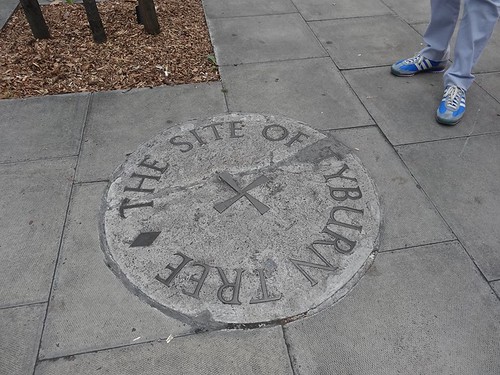 |
| Where 105 Catholics became victims of tyranny. |
This short passage in a book I'm reading struck me as worth sharing. The subject is cults--groups using psychological techniques to exploit their members for an ulterior goal (usually the enrichment of the founder).
In many groups, there is a "no gossip" or "no nattering" rule which keeps people from expressing their doubts or misgivings about what is going on. This rule is usually rationalized by saying that gossip will tear apart the fabric of the group or destroy unity, when in reality the rule is a mechanism to keep members from communicating anything other than positive endorsements.
M.T. Singer, Cults in Our Midst, pp69-70
Cults often defend themselves by pointing out superficial similarities with hierarchical and authoritarian organisations such as elite military units or traditional religious groups. This is one of the things which help one tell them apart. In the military, having the same things to complain about is actually one of the mechanisms by which recruits bond together as a unit; in cults care is taken to prevent communication, and the development of fellow-feeling, among them. I can't speak for other religions, but in the Catholic Church we are encouraged to 'manifest our concerns' not only up the chain of command--if we want to think in such terms--but horizontally. Canon 212: [the laity] have the right also to make their views known to others of Christ's faithful.
Reading about the horror of cults, whether religious, New Age, or based around get-rich-quick schemes or communication with Extra Terrestrials, makes me grateful for the things which prevent the Church from heading even a little in that direction. Another very important aspect is that all established religions have an objective tradition to which members can appeal, and against which the whims of their superiors can be judged and criticised. Religions which re-write their core texts, or let portions of them slip down the memory hole (or, even worse, don't have such texts), are treading a very dangerous path, because they are making the views of their current leaders the final court of appeal, not just in a disciplinary sense (which may be inevitable), but morally and rationally, for sincere members. At that point you are no longer struggling, with the help of the institutional leadership, to live a set of objective ideals, but are becoming the pawns, the playthings, of the leadership. This leadership may be benign, but isn't impeccable, and can easily, in the absence of constraints, become megalomaniacal, even if it didn't start that way.
Support the work of the LMS by becoming an 'Anniversary Supporter'.

